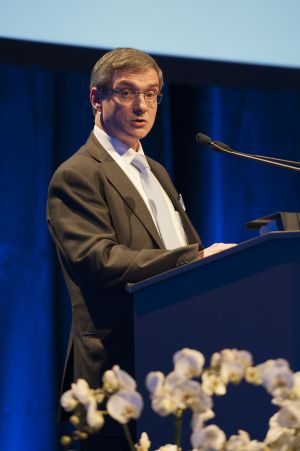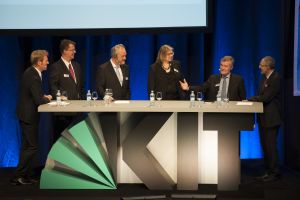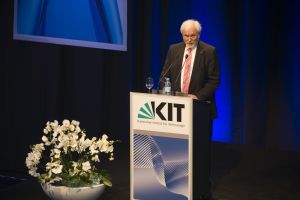German-French cooperation in research and education was in the focus of the Annual Reception of Karlsruhe Institute of Technology (KIT) at the Karlsruhe University of Arts and Design yesterday evening. Main topics covered were energy and environmental research. Global challenges like these can only be managed jointly, said KIT President Professor Eberhard Umbach. He emphasized that German-French partnership plays a central role for Europe.
50 years ago, Konrad Adenauer and Charles de Gaulle sealed the Elysée Treaty with a signature – and with an embrace. The deep friendship and countless bilateral projects in politics, economy, science, and society are of crucial importance not only to both countries, but to the whole of Europe, said KIT President Eberhard Umbach in his welcome speech at the Karlsruhe University of Arts and Design. “Especially in these difficult times of the European Union (EU), it is important that Germany and France have a reliable partner in each other. The alliance between both countries is the axle driving further development of the EU. It is this solidarity that is required to manage the challenges ahead.” Umbach pointed out that scientific cooperation helped France and Germany overcome historical and political borders so quickly.
In the past years, KIT established a number of successful cooperative ventures with French institutions in the areas of energy research, nano- and microtechnologies, scientific computing, and research into the universe. As an example, Umbach mentioned the European Institute for Energy Research (EIFER): For more than ten years now, researchers of KIT, together with scientists of Électricité de France (EDF), have been working on future energy supply. Another bilateral project is the German-French Institute for Environmental Research (DFIU) founded in 1991. Together with the University of Strasbourg and the Association for Monitoring and Investigation of Atmospheric Pollution (ASPA), KIT is working on making the trinational Upper Rhine region the most innovative region in Europe as regards sustainable use of biomass. Another important partner is the French Commissariat of Atomic Energy and Alternative Energies (CEA). In the education sector, both countries have established permanent exchange through joint German-French study programs e.g. in mechanical engineering and physics. Graduates are conferred a double degree by KIT as well as by a French partner university. Together with ENSAM Metz, KIT has granted 500 double degrees so far. Joint activities in research and education are complemented by numerous cooperative ventures with French companies. Moreover, KIT is member of EUCOR, the European Confederation of Upper Rhine Universities.
Long-term Cooperation in Energy Research
“Energy policies of both countries force us to understand today the practical consequences of the future transformation of the energy system,” said the Vice President of the EDF Group Bernard Salha in his keynote speech on Franco-German energy research. Among others, energy research focuses on sustainable urban planning and development. “The present challenge is to jointly prepare for the future and to learn from each other.” Salha pointed out that EIFER is an example of the joint effort. Here, the partners pool their strengths and competencies for the benefit of innovative projects and industrial development. EIFER is to be turned into a permanent institution such as to further extend the strategic partnership with KIT. Salha is Vice President of the EDF Group and Director of the Research and Development Division. With its 2000 researchers, it is responsible for all activities of the group in the production sector and for services offered to customers and grid operators.

EDF Vice President Bernard Salha (Photo: Irina Westermann)
Research, Innovation, and Academic Education in Germany and France
Cooperation between Germany and France is a reliable basis for research and development. Under the heading of “Learning from the Neighbor”, the podium discussion concentrated on bilateral research, innovation, and academic education. François Darchis, Senior Vice President of Air Liquide, underlined the advantages of new technologies. Under the “bioliq” project, joint research covers processes to convert biogenic residues into environmentally compatible fuels. Professor Bernard Bigot, Director of the Commissariat for Atomic Energy and Alternative Energies (CEA), looked back on the 50 years of joint development activities with great satisfaction. From nuclear technology to the transformation of the energy system, German and French scientists have been and are still working on European solutions on behalf of society. “As differences and common features are distributed well, we can learn a lot from each other,” added Dr. Karl-Friedrich Ziegahn, Chief Science Officer and Member of the Presidential Committee of KIT. He is responsible for the KIT Energy Center among others. Christiane Schmeken, Head of the Paris Office of the German Academic Exchange Service (DAAD), pointed out that students are attracted by cultural differences in life and research. Also Professor Johannes Orphal, Spokesman of the German-French Initiative of KIT, emphasized that the effort associated with familiarizing with two cultures is worthwhile. By working in both countries, Orphal knows both perspectives. “German-French cooperation offers great potentials for the future!”, he summarized.

Podium discussion: Presenter Markus Brock, Prof. Johannes Orphal, Dr. Karl-Friedrich Ziegahn, Christiane Schmeken, François Darchis, Professor Bernard Bigot. (Photo: Irina Westermann)
Innovation at KIT
KIT focuses on the triangle of research, education, and innovation. “As one of the largest science institutions in Europe, KIT is responsible for designing cooperation of science and industry and promoting a living entrepreneurial culture,” Eberhard Umbach said. He pointed out that it is the declared objective of KIT to establish an ideal basis and incentives for development and transfer of know-how, inventions, and innovative technologies. Success of this approach is also reflected by KIT being one of the winners of the Germany-wide EXIST competition in January this year.
To honor scientists with highly innovative ideas, KIT recently launched the innovation award NEULAND in the two categories of “Competition of Ideas” and “Transfer Projects Special Award”. Among the criteria for winning the competition were creativity, innovation potential, vicinity to market, and market potential as well as benefit for the society. KIT President Eberhard Umbach and Vice President Dr. Peter Fritz honored this year’s laureates during the Annual Reception. The Competition of Ideas Award in the amount of EUR 3000 was granted to Professor Norbert Willenbacher and Jens Dittmann from the KIT Institute for Mechanical Process Engineering for their project “Porous Materials”. Professor Horst Geckeis, Professor Clemens Walther, Dr. Wolfgang Hauser, Sebastian Büchner, and Robert Götz from the Institute for Nuclear Waste Disposal were handed over the Transfer Projects Special Award in the amount of EUR 3000 for “NPA/LIBD“, a process used to analyze nanoparticles. The numerous proposals submitted were assessed by a jury of five experts from industry. From now on, the KIT Innovation Competition will take place annually.
In close partnership with society, KIT develops solutions for urgent challenges – from climate change, energy transition and sustainable use of natural resources to artificial intelligence, sovereignty and an aging population. As The University in the Helmholtz Association, KIT unites scientific excellence from insight to application-driven research under one roof – and is thus in a unique position to drive this transformation. As a University of Excellence, KIT offers its more than 10,000 employees and 22,800 students outstanding opportunities to shape a sustainable and resilient future. KIT – Science for Impact.

